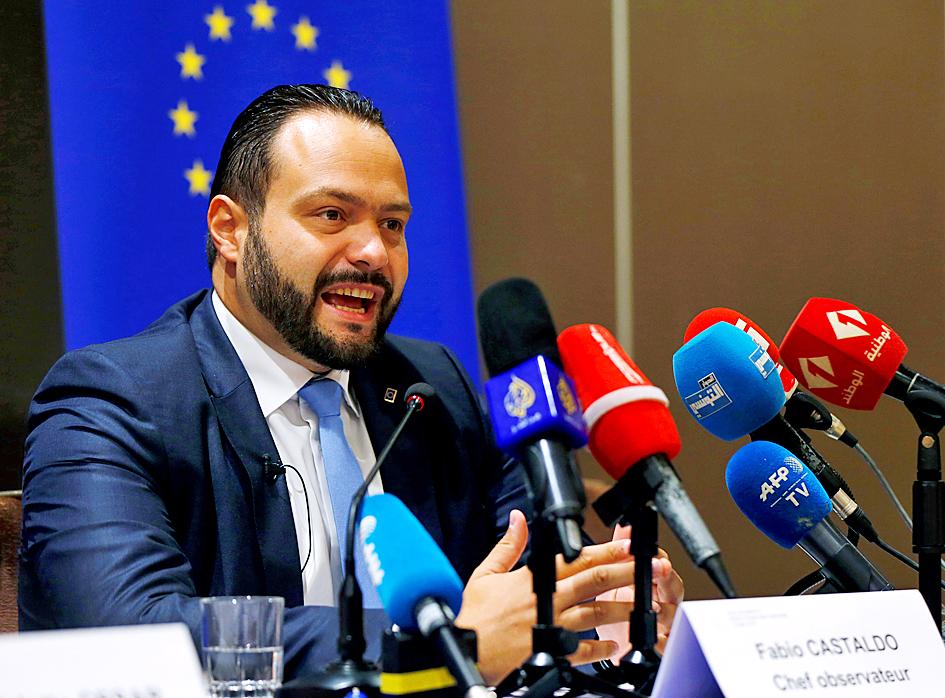The EU cannot tolerate increasing human rights abuses or remain silent in the face of an increasingly expansionist and aggressive foreign policy in the Indo-Pacific region and on a global scale, European Parliament Vice President Fabio Massimo Castaldo said in reference to China.
Castaldo made the remarks in an interview with Italian daily Il Manifesto published on Friday.
Compared with China’s advances in the region, Taiwan presents an alternative model, Castaldo said.

Photo: Reuters
The importance of deepening relations with Taiwan lies in that the nation and the EU share the values of democracy and freedom based on pluralism, and they fully respect the rule of law, he said.
If the EU wants to bolster its diplomatic and economic presence in the Indo-Pacific region amid intensifying confrontations between rival powers, it would be impossible not to develop closer relations with partners that share common values and principles, including Taiwan, Japan, India, Indonesia and South Korea, he said.
Castaldo also commented on a report passed last week by the European Parliament Committee on Foreign Affairs urging the EU to improve its relations with Taiwan.
The report says that the EU is increasingly concerned with China’s activities in the Indo-Pacific region, Castaldo said.
In the report, he emphasized Taiwan’s important position in the global supply chain and said that China has continued to obstruct the nation’s access to COVID-19 vaccines.
Regarding China’s retaliatory measures against Lithuania’s rapprochement with Taiwan and its protest against members of the European Parliament following the report, Castaldo used Hong Kong as an example, saying that Hungarian Prime Minister Viktor Orban’s government had twice vetoed EU declarations of support for Hong Kong, undermining the internal solidarity of the EU.
The EU’s foreign policy cannot be taken hostage by vetoes or influenced by governments with financial interests, he said.
If the bloc’s 27 member states can act in unity, they would become leading figures in international politics, economy and diplomacy, he said.
On the other hand, if they are divided, they would be vulnerable and become irrelevant, he said.
Castaldo added on Facebook that it was time for Europe to strongly support bolstering relations with Taiwan.
Castado is the youngest European Parliament vice president in history, elected to office in 2017 at the age of 32.
He is a non-attached member of the European Parliament and a member of Italy’s anti-establishment Five Star Movement, the largest party in the country’s parliament.

MORE VISITORS: The Tourism Administration said that it is seeing positive prospects in its efforts to expand the tourism market in North America and Europe Taiwan has been ranked as the cheapest place in the world to travel to this year, based on a list recommended by NerdWallet. The San Francisco-based personal finance company said that Taiwan topped the list of 16 nations it chose for budget travelers because US tourists do not need visas and travelers can easily have a good meal for less than US$10. A bus ride in Taipei costs just under US$0.50, while subway rides start at US$0.60, the firm said, adding that public transportation in Taiwan is easy to navigate. The firm also called Taiwan a “food lover’s paradise,” citing inexpensive breakfast stalls

TRADE: A mandatory declaration of origin for manufactured goods bound for the US is to take effect on May 7 to block China from exploiting Taiwan’s trade channels All products manufactured in Taiwan and exported to the US must include a signed declaration of origin starting on May 7, the Bureau of Foreign Trade announced yesterday. US President Donald Trump on April 2 imposed a 32 percent tariff on imports from Taiwan, but one week later announced a 90-day pause on its implementation. However, a universal 10 percent tariff was immediately applied to most imports from around the world. On April 12, the Trump administration further exempted computers, smartphones and semiconductors from the new tariffs. In response, President William Lai’s (賴清德) administration has introduced a series of countermeasures to support affected

CROSS-STRAIT: The vast majority of Taiwanese support maintaining the ‘status quo,’ while concern is rising about Beijing’s influence operations More than eight out of 10 Taiwanese reject Beijing’s “one country, two systems” framework for cross-strait relations, according to a survey released by the Mainland Affairs Council (MAC) on Thursday. The MAC’s latest quarterly survey found that 84.4 percent of respondents opposed Beijing’s “one country, two systems” formula for handling cross-strait relations — a figure consistent with past polling. Over the past three years, opposition to the framework has remained high, ranging from a low of 83.6 percent in April 2023 to a peak of 89.6 percent in April last year. In the most recent poll, 82.5 percent also rejected China’s

PLUGGING HOLES: The amendments would bring the legislation in line with systems found in other countries such as Japan and the US, Legislator Chen Kuan-ting said Democratic Progressive Party (DPP) Legislator Chen Kuan-ting (陳冠廷) has proposed amending national security legislation amid a spate of espionage cases. Potential gaps in security vetting procedures for personnel with access to sensitive information prompted him to propose the amendments, which would introduce changes to Article 14 of the Classified National Security Information Protection Act (國家機密保護法), Chen said yesterday. The proposal, which aims to enhance interagency vetting procedures and reduce the risk of classified information leaks, would establish a comprehensive security clearance system in Taiwan, he said. The amendment would require character and loyalty checks for civil servants and intelligence personnel prior to